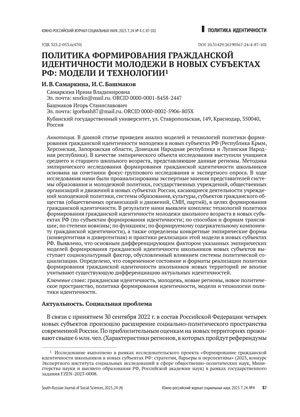Abstract
The paper presents an analysis of models and technologies that form the civic identity of young people in the new subjects of the Russian Federation (the Republic of Crimea, Kherson and Zaporozhye regions, Donetsk and Lugansk People’s Republics). The empirical object of the study was middle and high school students representing these regions. The methodology of the empirical study of schoolchildren’s civic identity formation is based on a combination of focus group research and expert survey. In the course of our research, we analyzed the opinions of experts representing various sectors of the education and youth policy system, state institutions, public organizations, and movements in the new constituent entities of Russia. These opinions pertained to the activities of youth policy institutions, the education system, the cultural system, and civil society actors (public organizations and movements, mass media, and political parties). Our objective was to ascertain the role of these institutions and actors in the formation of civic identity. Consequently, have we identified a complex of technologies for the policy of civic identity formation of school-age youth in the new subjects of the Russian Federation. These include the subjects of identity formation, the methods and forms of translation, the degree of novelty, the functions, and the content component of the civic identity that is formed. Furthermore, we have identified the specific empirical forms (convergent and divergent) and the practices of implementing this model in the new subjects of the Russian Federation. It is shown that the fundamental differentiating factor of the aforementioned empirical models of forming schoolchildren’s civic identity in the new subjects is the sociocultural factor, which is conditioned by the influence of the system of political socialization. It is evident that the current state and formats of implementing the policy of forming schoolchildren’s civic identity in the new territories are inadequate in their consideration of the existing differentiation of actual identities.
Keywords
Acknowledgements
The research was carried out within the framework of the project “Formation of civil identity of schoolchildren in new subjects of the Russian Federation: strategies, barriers and prospects” (2023, contest organized by Expert Institute of Social Research in the Field of Socio-Political Sciences, Ministry of Science and Higher Education of the Russian Federation, Russian Academy of Sciences) within the framework of the state task FZEN-2023-0008.
References
- Bernstein, M. (2005). Identity Politics. Annual Review of Sociology, 31(1), 47–74. DOI: 10.1146/annurev.soc.29.010202.100054
- Cherkashin, K. V., Terkulov, V. I., Tamer’jan, T.Ju. (2023). Jetnicheskaya samoidentifikatsija zhitelei Donbassa [Ethnic self-identification of Donbass residents]. Politicheskaja lingvistika [Political linguistics], 1(97), 113–128. DOI: 10.26170/1999-2629_2023_01_13
- Dege, M. (2014). Identity Politics. T.Teo (Ed.), Encyclopedia of Critical Psychology (934–1025). New York: Springer Science+Business Media. DOI: 10.1007/978-1-4614-5583-7
- Drobizheva, L. M. (2008). Natsional’no-grazhdanskaya i etnicheskaya identichnost’: problemy pozitivnoy sovmestimosti [National-Civic and Ethnic Identities: Problems of Positive Compatibility]. In M.K.Gorshkov (Ed.) Rossiya reformiruyushchayasya. Yezhegodnik [Russia in Reform. The Yearbook]. (214–228) Moskva: Institut sotsiologii RAN.
- Fedorenko, K. A. (2023). Gosudarstvennaya molodezhnaya politika po formirovaniyu grazhdanstvennosti rossiyskikh shkol’nikov [State Youth Policy on the Formation of Citizenship in Russian Schoolchildren]. Krasnodar: Perspektivy obrazovaniya.
- Mart’yanov, D. S. (2013). Nositeli politicheskogo soznaniya v kontekste novykh politicheskikh prostranstv [Carriers of Political Consciousness in Context of New Political Spaces]. Politeks [Politex], 4, 150–159.
- Nazukina, M. V. (2014). Novye tendentsii v politike identichnosti na regional’nom urovne v Rossii: aktory, spetsifika, trendy [New Trends in Identity Politics at the Regional Level in Russia: Actors, Specifics, Trends]. Antinomii [Antinomies], 3(14), 137–150.
- Nevola, G. (2011). Politics, Identity, Territory. The “Strength” and “Value” of Nation-State, the Weakness of Regional Challenge. Quaderni del dipartimento di Sociologia e Ricerca Sociale, 58.
- Nort, D. (1997). Instituty, institutsional’nye izmeneniya i funktsionirovanye ekonomiki [Institutions, Institutional Changes and the Functioning of the Economy]. Moskva: Nachala.
- Ostrom, E (2010). Upravleniye obshchim. Evolyutsiya institutsiy kollektivnogo deystviya [Managing the Common. The Evolution of Collective Action Institutions]. M: ANO IRISEN.
- Patrushev, S. V. (Ed.) (2006). Sovremennyy instituionalizm i politicheskaya transformatsiya Rossii [Modern Institutionalism and the Political Transformation of Russia]. Moskva: ISP RAN.
- Pishcheva, T. N. (2002). “Zatrudnennoe obshhenie” (Bar’ery v vosprijatii obrazov politikov) [“Difficult communication” (Barriers in the Perception of Images of Politicians)]. Polis. Politicheskie issledovaniya [Polis. Political Studies], 5, 158–169.
- Selezneva, A. V. (2011). Politiko-psihologicheskiy podhod k issledovaniyu politicheskih tsennostey [Political-Psychological Approach to The Research of Political Values]. Vestnik Tomskogo gos. un-ta [Tomsk State University Journal], 345, 56–60.
- Semenenko, I. S., Lapkin, V. V., Bardin, A. L., Pantin, V. I. (2017). Mezhdu gosudarstvom i natsiyey: dilemmy politiki identichnosti na postsovetskom prostranstve [Between the State and the Nation: Dilemmas of Identity Policy in Post-Soviet Societies]. Polis. Politicheskiye issledovaniya [Polis. Political Studies], 5, 54–78. DOI: 10.17976/jpps/2017.05.05
- Semenenko, I. S., Lapkin, V. V., Fadeeva, L. A. (2011) Politicheskaja identichnost’ i politika identichnosti [Political identity and identity politics]. V 2‑h tt. Tom 1. Identichnost’ kak kategorija politicheskoy nauki. Slovar’ terminov i ponjatii. M.: Rossiyskaya politicheskaya jenciklopediya.
- Semenenko, I. S. (2017). Grazhdanskaya identichnost’ [Civic identity]. In I.S.Semenenko (Ed.) Identichnost’: Lichnost’, obshhestvo, politika [Identity: Personality, Society, Politics] (354–358). Moskva: Izd-vo “Ves’ Mir”.
- Shestopal, E. B. (2018). Osobennosti ispol’zovaniya psihologicheskih metodov dlia izucheniya politicheskogo vospriyatiya [Psychological Methods in Political Perception Studies]. Social’naja psihologija i obshhestvo [Social Psychology and Society], 3(9), 81–90. DOI: 10.17759/sps.2018090309
 Русский
Русский


